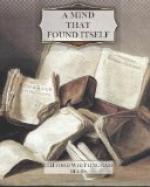The religious instinct is found in primitive man. It is not strange, therefore, that at this time the religious side of my nature was the first to display compelling activity. Whether or not this was due to my rescue from a living death, and my immediate appreciation of God’s goodness, both to me and to those faithful relatives who had done all the praying during the preceding two years—this I cannot say. But the fact stands out, that, whereas I had, while depressed, attached a sinister significance to everything done or said in my presence, I now interpreted the most trifling incidents as messages from God. The day after this transition I attended church. It was the first service in over two years which I had not attended against my will. The reading of a psalm—the 45th—made a lasting impression upon me, and the interpretation which I placed upon it furnishes the key to my attitude during the first weeks of elation. It seemed to me a direct message from Heaven.
The minister began: “My heart is inditing a good matter: I speak of the things which I have made touching the king: my tongue is the pen of a ready writer.”—Whose heart but mine? And the things indited—what were they but the humanitarian projects which had blossomed in my garden of thoughts over night? When, a few days later, I found myself writing very long letters with unwonted facility, I became convinced that my tongue was to prove itself “the pen of a ready writer.” Indeed, to these prophetic words I trace the inception of an irresistible desire, of which this book is the first fruit.
“Thou art fairer than the children of men; grace is poured into thy lips:” was the verse next read (by myself and the congregation), to which the minister responded, “Therefore God hath blessed thee for ever.”—“Surely, I have been selected as the instrument wherewith great reforms shall be effected,” was my thought. (All is grist that comes to the mill of a mind in elation—then even divine encomiums seem not undeserved.)
“Gird thy sword upon thy thigh, O most mighty, with thy glory and thy majesty”—a command to fight. “And in thy majesty ride prosperously because of truth and meekness and righteousness;” replied the minister. “And thy right hand shall teach thee terrible things,”—was another response. That I could speak the truth, I knew. “Meekness” I could not associate with myself, except that during the preceding two years I had suffered many indignities without open resentment. That my right hand with a pen should teach me terrible things—how to fight for reform—I firmly believed.
“Thine arrows are sharp in the heart of the King’s enemies, whereby the people fall under thee,” quoth the minister. Yes, my tongue could be as sharp as an arrow, and I should be able to stand up against those who should stand in the way of reform. Again: “Thou lovest righteousness, and hatest wickedness. Therefore God, thy God, hath anointed thee with the oil of gladness above thy fellows.” The first sentence I did not apply to myself; but being then, as I supposed, a man restored to himself, it was easy to feel that I had been anointed with the oil of gladness above my fellows. “Oil of gladness” is, in truth, an apt phrase wherewith to describe elation.




